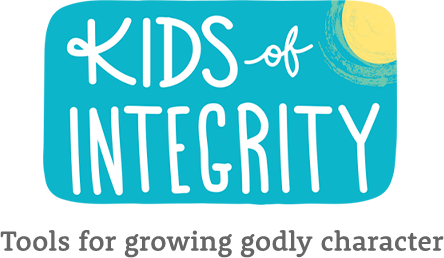Consideration
In this activity you’ll run some toy cars down a ramp to introduce kids to some simple laws of physics, then compare them to God’s “laws of consideration.”
Your goal is to help your children understand that both their physical actions and the words they say have an impact on others. You can spread this activity over three sessions if you wish.
Part one: Peace in motion
Newton’s First Law of Motion states that an object will remain at rest . . . unless acted upon by an external force. You’ll use toy cars to compare this with God’s first law of consideration which is Aim to live at peace with everyone.
Begin your teaching time by placing a toy car at the top of a ramp. Ensure the track begins with a flat section before heading downhill.
If you don’t have a Hot Wheels track or something like it, you can make a ramp by taping sections of cardboard boxes onto a staircase or other structure.
See how many different ways your children can send a car down the ramp without touching the car. For example, they could blow air though a straw, or use another car to push the first car.
Use the questions and key concepts below to discuss what you observed. After your discussion, pick a Bible verse and pray through it, asking God to help you choose peace instead of discord.
Questions for discussion
- Did the cars ever move on their own?
- Who made them move?
- Have you ever caused someone to get upset without ever touching them?
- What kinds of actions can get a brother, sister or friend upset without touching them?
- In those situations, who is responsible for causing the upset emotions?
- In the future, when you see someone playing happily, what can you do to make sure that person stays “at rest”?
Key concepts
The cars never moved on their own! Similarly, a child will rarely get angry with a sibling if they are not provoked.
God’s first law of consideration is Aim to live at peace with everyone. This means we should not stir up trouble on purpose. Just as it’s important to stop and consider what might happen before we jump into a pool, throw a ball, or pull a lever, it’s equally important to be considerate of the feelings of others before speaking or acting.
Relevant Scripture
Proverbs 20:3 “It is an honor for a man to keep aloof from strife, but every fool will be quarreling.
”
Romans 12:16-18 “Live in harmony with one another. Do not be haughty, but associate with the lowly. Never be wise in your own sight. Repay no one evil for evil, but give thought to do what is honorable in the sight of all. If possible, so far as it depends on you, live peaceably with all.
”
Romans 14:19 “So then let us pursue what makes for peace and for mutual upbuilding.
”
2 Corinthians 13:11 “Finally, brothers, rejoice. Aim for restoration, comfort one another, agree with one another, live in peace; and the God of love and peace will be with you.
”
Part two: You have the power
Newton’s Second Law of Motion explains that if a force acts on an object, it will cause that object to pick up speed in the direction the force was applied. This time, you’ll compare this law with God’s second law of consideration: Do your best to calm a situation that is headed in a bad direction.
To demonstrate these “laws” in action, let each child take a turn at placing a car on the launching end of your track. At first, ask your children to send their cars down the ramp as slowly as possible.
Next, show them how they can launch the car more quickly if they quickly lift the ramp up at a steep angle. Leave each car at the bottom of the track, so that each new car sent down the track ends up crashing into them.
Questions for discussion
- How did you make your car move down the ramp faster?
- What happened when you sent the car down faster?
- Can you think of some ways you can bother a sibling or a friend who is already upset?
- What usually happens when you do something to aggravate someone who is already upset?
- When a sibling is upset, what can you do to make the situation better?
Key concepts
Often when a child is upset, other kids love to upset that child even more! They might imitate the upset child or laugh at them or tease them.
The end result is a lot like sending a car down a ramp at an uncontrolled speed – there is inevitably a big crash at the end.
On the other hand, if someone is upset, there are many things you can do to help them calm down. The Bible provides instructions on dealing with emotionally charged situations. Let’s read these Bible verses and discuss what each one says about keeping the peace.
Relevant Scripture
Proverbs 15:18 “A hot-tempered man stirs up strife, but he who is slow to anger quiets contention.
”
Proverbs 26:17 “Whoever meddles in a quarrel not his own is like one who takes a passing dog by the ears.”
Proverbs 26:20 “For lack of wood the fire goes out, and where there is no whisperer, quarreling ceases.
”
Ephesians 4:29 “Let no corrupting talk come out of your mouths, but only such as is good for building up, as fits the occasion, that it may give grace to those who hear.
”
Galatians 5:25-26 “If we live by the Spirit, let us also walk by the Spirit. Let us not become conceited, provoking one another, envying one another.
”
Part three: Equal and opposite reactions
Newton’s Third Law of Motion explains that for every action, there is an equal and opposite reaction. In other words, if one object exerts a force on a second object, the second object exerts an equal force back at the first object.
This law is like God’s third law of consideration: Treat others the way you want to be treated! For example, if we speak to someone harshly, we can expect a harsh reply. When we speak softly, others will usually respond with gentleness in return.
To allow your children to experience this idea “hands on,” use some sturdy tape to hang a soft foam ball on a string in a doorway. Ask your kids to tap the ball lightly and observe what happens. Allow them to gradually increase the force of their tap. Eventually, let them hit the ball with enough force that it comes back at them quite quickly.
Questions for discussion
- What happened when you tapped the ball gently?
- What happened when you hit it harder?
- How is hitting the ball like having a conversation with another person?
- How do you like to be corrected?
- Before saying or doing something, how can you remember to think about the impact your words or actions will have on others?
Key concepts
Objects move based on how hard we apply force to them or how hard we push them.
The words we use when speaking to someone are similar. When others feel attacked by our words, they are more likely to be defensive and fight back. On the other hand, when we correct or approach someone with gentleness, they will probably respond politely. The Bible says exactly that too, saying “A soft answer turns away wrath, but a harsh word stirs up anger
” (Proverbs 15:1).
Even if someone does something wrong or bothers you on purpose, it’s important to correct them with kindness. This means approaching them with a gentle “tap” rather than an aggressive “shove.”
Speaking respectfully and using a soft tone helps solve problems and bring peace to heated situations, while speaking rudely or loudly escalates disagreements and difficult emotions.
Relevant Scripture
Proverbs 15:1 “A soft answer turns away wrath, but a harsh word stirs up anger.
”
Proverbs 15:18 “A hot-tempered man stirs up strife, but he who is slow to anger quiets contention.
”
Galatians 6:1 “Brothers, if anyone is caught in any transgression, you who are spiritual should restore him in a spirit of gentleness. Keep watch on yourself, lest you too be tempted.
”
Colossians 3:12-14 “Put on then, as God’s chosen ones, holy and beloved, compassionate hearts, kindness, humility, meekness, and patience, bearing with one another and, if one has a complaint against another, forgiving each other; as the Lord has forgiven you, so you also must forgive. And above all these put on love, which binds everything together in perfect harmony.
”
1 Thessalonians 5:15 “See that no one repays anyone evil for evil, but always seek to do good to one another and to everyone.
”
- Acceptance
- Adaptability
- Attentiveness
- Christmas
- Compassion
- Confidence
- Consideration
- Contentedness
- Cooperation
- Courage
- Courtesy
- Discernment
- Easter
- Faithfulness
- Forgiveness
- Generosity
- Gentleness
- Gratitude
- Harmony
- Honesty
- Humility
- Joy
- Kindness
- Obedience
- Patience
- Perseverance
- Respect
- Responsibility
- Reverence
- Righteousness
- Self-control
- Thanksgiving


